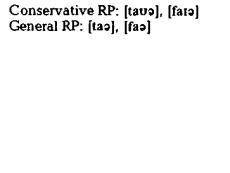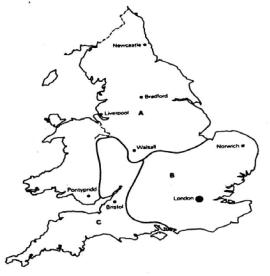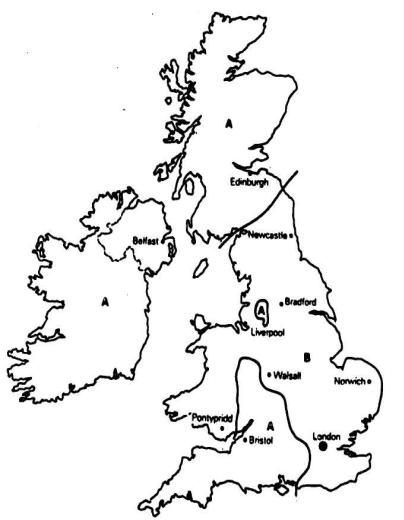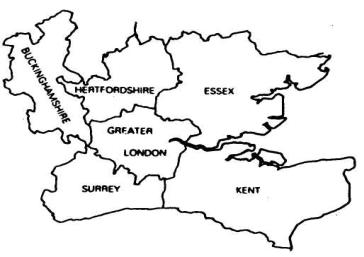
ГОС_1 / Теор. фонетика
.pdf
Changes of Vowel Quality
1.According to the stability of articulation. 1) It is generally acknowledged that two historically long vowels [i:], [U:] have become diphthongized and are often called diphthongoids; the organs of speech slightly change their articulation by the very end of pronunciation, becoming more fronted. Ch. Barber tries to draw a parallel with the Great Vowel Shift which took place in Middle English, where diphthongization was just one part of a complete change of pattern in the long vowels. He claims that there is some resemblance to this process today and other phonemes may move up to fill the places left vacant.
2.There is a tendency for some of the existing diphthongs to be smoothed out, to become shorter, so that they are more like pure vowels.
a)This is very often the case with [ei], particularly in the word final position, where the glide is very slight: [tə'dei], [sei], [mei].
b)Diphthongs [ai], [aU] are subject to a smoothing process where they are followed by the neutral sound [ə]:
c)Also diphthongs [Ɔə], [Uə] tend to be levelled to [Ɔ:]. Thus the pronunciation of the words pore, poor is varied like this:
It should be mentioned, however, that this tendency does not concern the diphthong [Iə] when it is final. The prominence and length shift to the glide, this final quality often being near to [٨]: dear [diə] – [di٨].
According to the horizontal and vertical movements of the tongue. Very striking changes occur in the vowel quality affected by the horizontal movements of the tongue. In fact the general tendency is marked by the centering of both front and back vowels:
a)the nuclei of [ai], [aU] tend to be more back, especially in the male variant of the pronunciation;
b)the vowel phoneme [æ] is often replaced by [a] by younger speakers: [hæv] – [hav], [ænd] – [and];
c)the nucleus of the diphthong [зu] varies considerably, ranging from [ou] among conservative speakers to [зu] among advanced ones:
Conservative RP: [sou], [foun], [nout];
Advanced RP: [sзu], [fзun], [nзut].
This tendency is so strong that the transcription symbol has been recently changed in many British books: [ou] – [зu].
d)Back-advanced vowels [٨], [u] are considerably fronted in the advanced RP: but [b٨t] – [bət], good [gud] – [gəd].
It should be mentioned here that there is a tendency for all short vowels to be made nearer the centre of the mouth, that is to move towards [ə], especially in unstressed position: honest ['ɒnIst] – ['ɔnəst].
Thus the horizontal changes in vowel quality may be listed like this: Centering of short vowels:
141

The trend towards schwa in weak syllables is now so firmly established among middle and young generations of RP speakers that the following changes in the ordering of pronunciation variants have been made in EPD – 1997 as compared with the 13th and earlier editions of this pronouncing dictionary [Паращук 2000:166]:
-ity: [ətI] is generally more common than [ItI], e.g. quality, capacity;
-ate (in nouns and adjectives): [ət] is more common than [It], e.g. deliberate, delicate, chocolate, fortunate;
-ess: [əs] gains grounds and is introduced as the main variant, e.g. hopeless, goodness;
-et: [ət] gains grounds and is introduced as the main variant, e.g. sonnet, carpet, bonnet; [it] is generally used after [k], [g], [ʧ], [ʤ], e.g. pocket, target, hatchet, budget; However, in the endings
-let, -ret, e.g. bracelet, scarlet, toilet, claret, garret [ət] is either a dominant or a common variant.
-ily, e.g. easily, happily, worthily: [ə] gains ground especially after [r]: angrily, Primarily, extraordinarily, when it is a dominant form, and in certain words as foreign;
-ace, e.g. palace, necklace, populace: [I] and [ə] are alternatives with the increasing tendency to [ə]. In the terminations -es, -ed, e.g. horses, waited: [iz], [id] forms remain dominant in RP even among the young, despite the influence of the alternatives [əz], [əd] characteristic of American and Australian English;
[I] is replaced by [ə] in weak syllables of a number of assorted words as: cinema, majesty, relevance, satirical, secrecy, system, temperature, family, etc., in which [ə] has become the dominant variant.
English-Ukrainian or English-Russian translation dictionaries which are widely used in TEFL practices in Ukraine predominantly refer to earlier editions of EPD and do not reflect recent or current selectional changes in RP. Thus, Ukrainian learners of
English should be referred to the CEPD-2003 or the LPD-2000 for update pronunciation variants.
More back pronunciation of the nuclei of diphthongs: [ai] [ai], [au] [au]. More advanced pronunciation of the diphthong: [ou] [зu].
More fronted pronunciation of the diphthongoids: [i:] [i(j)], [u] [u(w)].
Vertical changes in vowels may be traced in [e] and [ɔ:] which tend to be closer in advanced RP. The nuclei of diphthongs [ei], [εə], [ɔə], [uə] become more open when these phonemes are being levelled, particularly the diphthong [εə], which is characterized by a great opening of the first element: careful ['kεəful] – ['kε:ful]. The first element of the diph- thong [uə] can be lowered considerably. Thus several words with [Uə] are given a shade [ɔə] pronunciation by some advanced RP speakers: poor, sure [puə, ∫uə] — [pɔə, ∫ɔə].
Combinative changes. It is general knowledge that when sounds are in company they influence each other. These changes are called combinative. They take place only in certain phonetic contexts.
1.Changes in [j + u:], [l + u:] (Yod dropping). Words like suit, student, super may be pronounced either [sju:t] or [su:t], ['stju:dənt] or ['stu:dnt], ['sju:pə] or ['su:pə]. The tendency is for middle-aged and younger speakers to omit the [j] after [s] before [u:]. Word-internally [j] tends to be retained as in assume [as'ju:m]. There is also fluctua tion after [l]: word-initially lute [lu:t] is normal, but it is possible to pronounce [i'lju:zn] in illusion, for example. These recent developments in combinative RP changes bear remarkable resemblance to American Standard pronunciation.
2.Change of [ɔ:] to [ɒ] before [f, s, θ]. Where orthographic "o" occurs before the voiceless fricatives [f, s, θ] older speakers pronounce the vowel [ɔ:]: loss [lɔ:s]. This pronunciation is currently dying out in RP and being replaced by [ɒ]: [lɒs]. Words
142
like salt and fault still may be pronounced with [ɔ:].
Changes in length. It is an accepted fact that English vowels vary in length according to the phonetic context – the consonant they are followed by (voiceless, voiced), syllabic border, the degree of stress, the types of nuclear tone and so on.
Actually nowadays there are changes in vowel length that are influenced by other factors. There is, for example, a strong tendency for the so-called short vowels to be lengthened, and it is interesting to note that this lengthening can be heard sporadically in many words in any position.
The lengthening of [i] is often heard in big, his, is; of [u] in good; [٨] in come. It should also be mentioned that [i] is often lengthened in the final syllable, i.e. very, many:
['veri:], ['meni:].
Short vowels [e, æ] are also very frequently lengthened in yes, bed, men, said, sad, bad, bag and so on. This tendency has considerably increased in the past few years.
Changes in Consonant Quality
Voicing and Devoicing. There is no opposition of final RP consonants according to the work of the vocal cords. They are all partially devoiced, particularly stops. Such devoiced sounds are clearly heard after long vowels and diphthongs as in deed: [di:d]. However, these partly devoiced consonants are never identical with their voiceless counterparts, because the latter are pronounced with strong breath-force.
This tendency for devoicing now seems to be on the increase. As soon as the op- position of voiced – voiceless is neutralized in the final position, the fortis/lenis character of pronunciation has become the relevant feature of consonants.
The voiced / voiceless distinction of the minimal pairs [sed] – [set], [dɔg] – [dɔk] may seem to be lost. Actually it does not take place. The weak consonants are never replaced by their voiceless counterparts, they never become strong, the stops [b, d, g], though de- voiced, never acquire aspiration. More than that. The interrelation of final consonants and the preceding stressed vowels is very close. The instrumental investigation of E.G. Kurjatnikova [1983] showed that the duration of the vowel before the traditionally called voiced consonant is 1,5 times larger than that before the voiceless consonant. Cf.:
He saw his cap. – He saw his cab.
Describing the positional allophones of the English stops A.C. Gimson character- izes the initial lenis [b, d, g] as partially de-voiced, final lenis [b, d, g) as voiceless.
The sound [t] in the intervocalic position is made voiced, e.g. better ['betə] – ['bedə], letter ['letə] – ['ledə].
Loss of [h]. In rapid speech initial [h] is lost in form words and tends to die out from the language. Even most highly educated people subconsciously drop it completely. So instead of: He wants her to come [hi· wɒnts hз· tə ̖k٨m] one hears: [i: wɒnts з· tə ̖k٨m].
It is evident, of course, that the loss of [h] in stressed syllables sounds wrong.
Initial "hw". Some conservative RP speakers pronounce words like why, when, which with an initial weak breath-like sound [h] – [ʍ]. The general tendency is, however,
to pronounce [w].
Loss of final [ŋ] The pronunciation of [in] for the termination [iŋ] has been retained as an archaic form of the RP: sittin', lookin'. These occasional usages are not likely to be-
come general.
Spread of "dark" [ł ]. This tendency is evidently influenced by the American pro- nunciation and some advanced RP speakers are often heard saying [ł ]] instead of [1] as in believe, for example. There is no threat in spreading it widely yet but it is quite common for pop singers now. It should also be mentioned that sometimes final [ł] tends to be vocalized as in people, for instance, but is not likely to become a norm.
L VOCALIZATION is the development whereby the 'dark' allophone of [l] loses its alveolar lateral nature and becomes a vowel of the [o] or [u] type. L vocalization is re- stricted to the preconsonantal and word-final environments (except where the following
143
word begins with a vowel). Examples are ['miok] milk, ['mido] middle. As Gimson points out [1981: 203], there are plenty of RP speakers who use it in labial environments, as [mai'seof] myself, ['teiboz] tables. Cockney clearly has much more l-vocalization than does RP. In particular, Cockney uses it where RP would have a laterally released alveolar plosive, as little, middle, and across certain word boundaries where RP would usually have the 'clear' allophone, as, for example if...
Glottal stop. In RP the glottal stop [?] can appear only in the following two environ- ments: a) as a realization of syllable-final [t] before a following consonant as in batman
['bætmən] – ['bæ?mn] or not quite ['nɔt 'kwait] — ['nɔ? 'kwait]; b) in certain consonant clusters as in box, simply [bɔ?ks], ['sI?mplI], where it is known as "glottal reinforcements". The
use of glottal stop by advanced RP speakers produces a "clipped" effect on a foreigner. Among younger RP-speakers glottaling can even be heard finally before vowels
(pick it up [рIк I? ٨р]) or in absolute final position (Let's start! [le?s sta:?]). Intervocalically within a word, it remains firmly excluded from RP (cf. Cockney city ['sI?I]). Nevertheless, the increased use of glottal stops within RP may reasonably be attributed to influence
from Cockney and other working-class urban speech.
Palatalized final [k'] is often heard in words week, quick, etc.: [wi:k'], [kwIk']. Linking and intrusive [r] It has been estimated that all English accents are divided
into "rhotic" or "r-full" and "non-rhot-ic" or "r-less". Rhotic accents are those which actually pronounce [r] corresponding to orthographic "r". RP is a non-rhotic accent but most
speakers of it do pronounce orthographic "r" word-finally before a vowel: It is a far away country. It is known as linking "r". Failure by students to pronounce it does not usually
affect comprehension but may result in their sounding foreign.
As a further development and by analogy with linking "r", "r" is inserted before a following vowel even though there is no "r" in spelling. This "r" is known as intrusive "r". The actual situation is that younger RP speakers do have it after [ə] as in idea of, China and.
It is said that nowadays in colloquial fluent speech there is a strong tendency towards elision, reduction and assimilation. This tendency is reflected in the pro- nunciation of the young generation: tutor ['t∫U:tə], second year ['sekənʤIə], perhaps you [pə'hæpʃu:], gives you ['givʒu:], as you know [azju: 'nзu]; in the transcribed texts of British textbooks: him [Im], he [i:], her [з:], his [iz], can [kn], from [frm], than [ðn], them [ðm], some [sm], suppose [spзUz], have to ['həftə], usually ['ju:zwəli], last time ['lastaim], and there was no one [ən ðər wz 'nзu w٨n]; even in the traditional spelling: C’m on, baby, Sorry 'bout that. Oh, le'mme see. Oh, I dunno Must’ve put’em all together. Why d'you ask? What dja think? Alright!
Combinative changes. Sound combinations [tj, dj, sj] are pronounced as [ʧ, ʤ, ʃ] respectively, e.g. actual ['æktjUəl] – ['aektSUəl], graduate ['grædjuəit] – ['græʤueit], issue
['isju:] – ['isu:].
A number of distinct environments for yod coalescence can be distinguished:
1.yod coalescence (coalescent assimilation) is well-established in casual RP, involving the clitic you or your, as ['wɔʧu 'wɔnt] what you want, [puʧɔ:] put your (things down),
['wuʤu 'maind] would you mind. It is avoided in careful style, and is sometimes looked on as a Cockneyism. Where [t] is involved, it faces a rival in glottalling, as ['wɔ?ju] what you...: in the course of time one development or the othermust presumably win out;
2.within a word, involving an unstressed vowel in the right-hand environment, RP is drifting towards categorical coalescence. In some words it has long been the norm (picture, soldier), while in others its use in RP is more recent and subject to stylistic variation. D. Jones [EPD 12th edition, 1963] recognizes both possibilities in actual and gradual, but only [tj] in perpetual, only [dj] in graduate; these are now careful pronunciations, with everyday RP variants involving [ʧ, ʤ]. In statue and virtue he admits only [tj], but in LPD J.C. Wells gives [tS] as the main variant;
3.within a stressed syllable, e.g. tune, duke, coalescence is still on the whole
perceived as non-RP. Nevertheless, traditional RP [tju:n, dju:k] face strong popular competition in [ʧu:n, ʤu:k]; in near-RP, the first syllable of Tuesday may well be
144
like choose and the last syllable of reduce just like juice. It seems likely that here,
too, coalescence may penetrate RP within a few decades. Cockney usage is divided between yod coalescence and yod dropping [tu:n, du:k] [Wells 1982: 330]. In the
clusters of two stops, where the loss of plosion is usually observed, each sound is pronounced with audible release e.g. active ['æk tiv] – ['æktiv], sit down ['sit
'daun] — ['sit 'daun].
LEXICAL CHANGES are those that affect specific items of vocabulary rather than all (or most) words meeting a particular phonetic structural description. The opinion poll findings reported in LPD for British English often reveal pronunciation preferences differ- ing from those of earlier generations:
•con'troversy is taking over from initial-stressed 'controversy,
•contribute, 27% of the panel claimed to prefer initial stress,
•suit, the poll showed, [su:t] is now preferred over jones's [sju:t] by a margin of 72% to 28%,
•nephew [ 'nefju:] now beats the traditional ['nevju:] by 79% to 21 %.
Non-systematic Variations in RP Phonemes
Some free phonemes have appeared under the influence of the written image of words, their spelling.
Unstressed prefixes ex- and con- have gained orthographical pronunciation: excuse [iks'kju:z] – [eks'kju:z], exam [ig'zæm] – [eg'zæm], continue [kən'tinju:] – [kɔn'tinju:], consent [kən'sent] – [kɔn'sent].
The days of the week: Sunday ['s٨ndi] – ['s٨ndei], Monday ['m٨ndi] – ['m٨ndei]. Note also free variants in often: ['ɔfən] – ['ɔft(ə)n].
Other cases: economics [,ikə'nɔmiks] – [,ekə'nɔmIks].
Not all the changes are recognized as a norm by most affected advanced RP speakers. Some of these changes are quite stable, some tend to disappear. The language is a living body and its oral aspect is most vitally changeable. But one should realize the importance of most recent developments, which, in opinion of many prominent phoneticians, may lead to radical changes in the whole inventory of vowel and consonant phonemes.
One of the British accents (or dialects?) that has received a lot of publicity since the mid 80s of the last century is Estuary English (EE) named so after the banks of the
river Thames and its estuary. Some researches predict that EE is due to take over as the new standard of English, others are more cautious in their assessment of its status. They claim that EE is an accent which incorporates a mixture of south-eastern, RP and Cockney features and which has been gaining popularity with educated speakers not only in London and in the estuary of the Thames, but in other areas due to high mobility of the population. This situation is clearly reflected in the title of J. Maidment's paper "Estuary
English: Hybrid or Hype?" [Maidment 1994].
The term Estuary English was coined in 1984 by David Rosewarne, who at that time was a post-graduate student of Applied Linguistics. He defines EE as follows "Estu- ary English is a variety of modified regional speech. It is a mixture of non-regional and local south-eastern pronunciation and intonation. If one imagines a continuum with Received Pronunciation and London speech (Cockney) at either end, EE speakers are to be found grouped in the middle ground" [Rosewarne 1984]. EE received great media attention in 1993 when Paul Coggle's book was published "Do you speak Estuary?" which was subtitled 'the new Standard English' [Coggle 1993].
A wealth of sources on EE can be found at http://www.phon.ucl.ac.uk/home/ estuary/ htm, some of them being debatable and/or controversial. In our opinion, a reasonable approach to the subject of EE, useful for EFL practices, is given by J.C. Wells and J.A. Maidment [Maidment 1994; Wells 1997]. Here we will summarize major phonetic characteristics of EE based on the findings of the above mentioned scholars. According to
J. C. Wells, many of the features that distinguish EE from RP are features it shares with
Cockney. Unlike Cockney, EE is associated with standard grammar and usage. But EE agrees with Cockney,and differs from RP, in having (perhaps variably):
145

1.happY-tensing – tense vowel і at the end of happy, coffee, valley etc.
2.T glottalling finally, e.g. take i? off, qui?e nice etc.
3.L vocalization – pronouncing the [l] sound in preconsonantal and final positions almost like [w], e.g. milk, bottle, etc.;
4.Yod coalescence in stressed syllables, e.g. Tuesday, tune etc. that makes the first part of Tues- sound identical to choose or duke, reduce etc. making the second part of reduce identical to juice.
5.diphthong shift: the diphthongal vowels of FACE, PRICE, GOAT in EE are those that would be used by Cockney speakers.
6.EE differs from Cockney in that it lacks:
7.H dropping/omitting (in content words), so that Cockney hand on heart becomes
'and on 'eart.
8.TH fronting, using labio-dental fricatives [f] and [v] instead of [θ], [ð]. This turns I think into [ai fIŋk], and mother into ['m٨və].
9.T glottalling within a word before a vowel, e.g. water, mattress, twenty. Cockney speakers use ? for [t] in all environments where it is not syllable initial. Also sometimes they extend glottal replacement to affect [p] and [k] as well as [t].
J. C. Wells claims that" ...EE is a new name but not a new phenomenon, being the continuation of a trend that has been going on for five hundred years or more - the ten- dency for features of popular London speech to spread out geographically (to other parts of the country) and socially (to higher classes). The erosion of the English class system and the greater social mobility in Britain today means that this trend is more noticeable today than was once the case ..." [Wells 1997].
EFL teachers should pursue a realistic aim: rather than trying to adopt EE, it is more advisable to teach up-to-date RP gradually incorporating typical changes of EE.
Regional Non-RP Accents of England
We grouped regional accents of England into southern and northern ones. This division is very approximate of course, because there are western and eastern accents but their main accent variations correspond either with southern or northern accentual characteristics. Thus we would like to point out here the main differences between southern and northern accents.
Picture 1
Before the voiceless fricatives [f], [θ], [s] and certain consonant clusters containing initial [n] or [m], [æ] is pronounced in the North instead of [a:] in the South.
146

Example 1
In vowels
One of the main differences between these groups of accents is in the phoneme inventory – the presence or absence of particular phonemes. Typically, the vowel [٨] does not occur in the accents of the north; e.g.
Example 2
We can also note that many northern speakers while they do not have [٨] have [u:] rather than [u] in words such as hook, book, look. They therefore distinguish pairs like book and buck, which in the south sound [buk] and [bək], in the north as [bu:k] and [buk]:
Example 3
Another well-known feature which distinguishes northern and southern accents concerns the vowels [æ] and [a:].
Before the voiceless fricatives [f, θ, s] and certain consonant clusters containing initial [n] or [m], [æ] is pronounced in the north instead of [a:]
Note: Speakers with more strongly regional southern substandard accents may not have the contrast or, at most, have a contrast that is variable.
In the south, however, [æ] is often pronounced as [a:]
Example 4
One more major north – south differentiating feature involves the final [i:] like in words city, money, etc. In the north of England they have [i]. In the south of England these words are pronounced with [i:], e.g.
Example 5
Rhoticism, i.e. retaining post-vocalic [r], is spread in Scotland, Ireland, and Southwest in words like bar, farm, etc. which have the orthographic “r”. Non-rhotism, i.e. absence of post-vocalic [r], is typical of RP and Welsh English. Thus, some British English accents are “rhotic” or “r-ful” and others are “non-rhotic” or “r-less”. The map in picture 2 shows the
spread of post-vocalic [r] (A = post-vocalic [r] present, B = post-vocalic [r] absent).
In most regional accents the glottal stop is more widely used than in RP. In some areas, especially the north-east of England, East Anglia and Northern Ireland, the glottal stop may also be pronounced simultaneously with the voiceless [p, t, k], most strikingly between vowels: pity [‘pit?i:].
147

In consonants
Picture 2
Many non-RP speakers use [n] in the suffix "-ing" instead of [ŋ]; sitting ['sitin]. In an area of western central England which includes Birmingham, Manchester and Liverpool they pronounce [ŋg]: singer ['siŋgə], wing [wiŋg].
In most accents [j] is dropped after [t, s]: student ['stu:dənt], suit [su:t]. In parts of the north the change has progressed a good deal further, it has been lost after [θ]: en thusiasm [ən'θuziəzm].
In large areas of eastern England [j] is lost after every consonant. In London [j] is lost after [n, t, d]: news [nu:z], tune [tu:n].
Southern English Accents
Educated Southern speech is very much near-RP accent whereas non-standard accents are very much near Cockney. Therefore we shall focus our attention on the rather detailed description of uneducated London accent – Cockney.
It has been long established that Cockney is a social accent – the speech of work- ing-class areas of the Greater London.
148

Picture 3
Cockney speakers have a distinctive accent and dialect, and frequently use Cock-
ney rhyming slang. |
|
|
Cockney GRAMMAR has the following distinctions: |
|
|
multiple negations |
e.g. I ain't never done nothing |
|
specific verb morphology |
e.g. You seen 'im ! – I never! They |
done You was. |
reflexive pronouns |
e.g. 'E"II 'urt 'isself. That's yourn. |
|
demonstratives |
e.g. them books |
The boys done good. |
adverbs without -ly |
e.g. Trains are running normal. |
|
prepositions |
e.g. down the pub,, out the window |
|
possessive pronouns |
e.g. Where's me bag? |
|
Cockney is distinguished by its special usage of VOCABULARY – rhyming slang. Many of its expressions have passed into common language. It developed as a way of obscuring the meaning of sentences to those who did not understand the slang. It remains a matter of speculation whether this was a linguistic accident, or whether it was developed intentionally to assist criminals or to maintain a particular community [http://www. nationmaster.com/encyclopedia/cockneyrhyming slang].
Rhyming slang works by replacing the word to be obscured with the first word of a phrase that rhymes with that word. For instance, "face" would be replaced by "boat", because face rhymes with "boat race" [Examples are taken from: http:// www.nationmaster.com/encyclopedia/cockneyrhymingslang]. Similarly "feet" becomes "plates" ("plates of meat"), and "money" is "bread1 (a very common usage, from "bread and honey"). Sometimes the full phrase is used, for example "Currant Bun" to mean The Sun (often referring to the British tabloid newspaper of that name). Some substitutions have become relatively widespread in England, for example, to "have a butcher's" means to have a look, from the rhyming slang "butcher's hook".
Cockney rhyming slang is often used in films (such as Lock, Stock and Two Smoking Barrels (1998), which contains a glossary of Cockney Rhyming Slang on the DVD version to assist the viewer) and on television (e.g. Minder, East Enders) to lend authenticity to an East End setting. There are samples of Cockney dialect in many books of fiction, for example Eliza Doolittle in George Bernard Shaw's Pygmalion (see also My Fair Lady), William Somerset Maugham's novel Liza ofLamberth, Me and My Girl (musical), the speech of Mr. Sam Weller (both junior and senior) in The Posthumous Papers of the Pickwick Club
by Ch. Dickens, etc.
COCKNEY PHONOLOGY. There are no differences in the inventory of vowel and consonant phonemes between RP and Cockney [Gimson 2001: 87] and there are relatively
149
few differences of phoneme lexical distribution. There are, however, a large number of differences in realization of phonemes. Most striking realizational differences can be summarized as follows [See: Gimson 2001: 86-87]:
In vowels
Main distinctions in the realization of COCKNEY VOWELS include [Gimson 2001: 87-88]:
1.The short front vowels [e], [æ] tend to be closer than in RP so much, that Cockney sat may sound as set and set like sit to the speakers of other accents.
2.Among the long vowels, most noticeable is the diphthongization of [і:] [əi], [u:] [əu], thus bead = [bəid], boot = [bəut].
When [ɔ:] is final, it is pronounced as [ɔwə], sore, saw = [sɔwə]; when it is not final,
its realization is closer [ɔu].
[٨] is realized as [æi]: blood [bl٨d] – [blæid];
[æ] is realized as [ε] or [εi]: bag [bæg] – [bεg], [bεig];
[i] in word-final position sounds as [i:] city ['siti] – ['siti:]; rp [зu] sounds as [æu]: soaked [sзukt] – [sæukt];
rp [au] may be [æə]: now [nau] – [næə].
DIPHTHONG SHIFT. Cockney uses distinctive pronunciation of RP diphthongs: the diphthong [ei] is realized as [æi] or [ai]: lady ['leidi] – [læidi:], [laidi:];
[ai] sounds as [ɔi]~[ ai], e.g. price= [prɔis]; [əu] sounds as [æu], e.g. load [læud]; [au] sounds as [a:], e.g. loud [la:d];
[i] LENGTHENING, [i] in word final positions sounds as [i:], e.g. city = ['siti:]
WEAKENING. RP diphthong [əu] in window, pillow is weakened to schwa [ə].You, to are pronounced as [jə], [tə], especially finally, e.g. see you, try to.
In consonants
1.H DROPPING, [h] is not pronounced in initial positions in words which have this phoneme in RP, e.g. have, hat, horse = [əv], [æt], [hɔ:s]. [h] is used, however , in
initial positions in words which in RP begin with a vowel. Thus the words air, atmosphere, honesty are pronounced in Cockney as [heə], [hætməsfiə], ['hɔnəstI].
2.[?] is widely spread in Cockney speech: paper ['pæi?pə], butterfly ['b٨təflai];
3.the contrast between [θ] and [f] is completely lost: thin [fin], booth [bu:f];
4.The contrast between [ð] and [v] is occasionally lost: weather ['wevə];
5.when [ð] occurs initially it is either dropped or replaced by [d]: this [ðIs], them [(d)əm];
6.[l] is realized as a vowel when it precedes a consonant and follows a vowel, or when it is syllabic: milk [mIvk], table [teibv]; when the preceding vowel is [ɔ:], [l] may disappear completely;
7.[ŋ] is replaced by [n] in word-final position: dancing ['dansIn] or it may be pronounced as [Iŋk] in something, anything, nothing: [n٨fIŋk];
8.[p, t, k] are heavily aspirated, more so than in RP;
9.[t] is affricated, [s] is heard before the vowel: top [tsɒp].
10.YOD COALESCENCE. There is coalescence of [t], [d] before [j] into [ʧ], and [ʤ], e.g. tube [ʧu:b], during [‘ʤuərin], but elision of [j] followed by [n], e.g. news [nu:z].
Northern and Midland Accents
Midland accents, Yorkshire, for example, West Midland and North-West accents have very much in common with Northern ones.
Northern accents
The counties of northern England are not far from the Scottish border, so the influence of Scotch accent is noticeable, though there are of course many features of pronunciation characteristic only of northern English regions. The most typical representative of the speech of this area is Newcastle accent. It differentfers from RP in the following:
150
